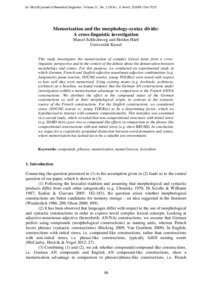Datum
2016Schlagwort
400 Sprachwissenschaft, Linguistik NominalkompositumAdjektivkompositumKontrastive LexikologieMentales LexikonMetadata
Zur Langanzeige
Aufsatz

Memorization and the morphology-syntax divide: A cross-linguistic investigation
Zusammenfassung
This study investigates the memorization of complex lexical items from a cross-linguistic perspective and in the context of the debate about the demarcation between morphology and syntax. For this purpose, we conducted an experimental study in which German, French and English adjective-noun/noun-adjective combinations (e.g. Jungtourist, jeune touriste, YOUNG tourist, young TOURist) were tested with respectto how well they were memorized. Using existing nouns (e.g. Architekt, architecte, architect) as a baseline, we found evidence that the German AN constructions under investigation exhibit a memorization advantage in comparison to the French AN/NA constructions. We attribute the effect to the compound status of the German constructions as well as their morphological origin, in contrast to the syntactic source of the French constructions. For the English constructions, we considered stress (YOUNG tourist vs. young TOURist) to be a determining factor, which we hypothesized to interact with semantic compositionality. This interplay was examined in a second study, which revealed that non-compositional structures with initial stress (e.g. HARD shirt) gave rise to compound-like effects in comparison to the phrase-like compositional constructions with non-initial stress (e.g. short BRUSH). In conclusion, we argue for a cognitively grounded distinction between word-formation and syntax, where memorization has turned out to be a suitable test environment.
Zitierform
In: SKASE journal of theoretical linguistics Volume 13 / No. 2 (2016) , S. 46-68 ; eissn:1336-782XZusätzliche Informationen
Punliziert im "Special Issue: Selected papers from the Word-Formation Theories conference, Košice, 26-28 June, 2015. Guest editors: Aleksandra Bagasheva and Jesús Fernández-Dominguez"Zitieren
@article{doi:10.17170/kobra-202105123884,
author={Schlechtweg, Marcel and Härtl, Holden},
title={Memorization and the morphology-syntax divide: A cross-linguistic investigation},
journal={SKASE journal of theoretical linguistics},
year={2016}
}
0500 Oax
0501 Text $btxt$2rdacontent
0502 Computermedien $bc$2rdacarrier
1100 2016$n2016
1500 1/eng
2050 ##0##http://hdl.handle.net/123456789/12964
3000 Schlechtweg, Marcel
3010 Härtl, Holden
4000 Memorization and the morphology-syntax divide: A cross-linguistic investigation / Schlechtweg, Marcel
4030
4060 Online-Ressource
4085 ##0##=u http://nbn-resolving.de/http://hdl.handle.net/123456789/12964=x R
4204 \$dAufsatz
4170
5550 {{Nominalkompositum}}
5550 {{Adjektivkompositum}}
5550 {{Kontrastive Lexikologie}}
5550 {{Mentales Lexikon}}
7136 ##0##http://hdl.handle.net/123456789/12964
<resource xsi:schemaLocation="http://datacite.org/schema/kernel-2.2 http://schema.datacite.org/meta/kernel-2.2/metadata.xsd"> 2021-07-01T15:10:32Z 2021-07-01T15:10:32Z 2016 doi:10.17170/kobra-202105123884 http://hdl.handle.net/123456789/12964 Punliziert im "Special Issue: Selected papers from the Word-Formation Theories conference, Košice, 26-28 June, 2015. Guest editors: Aleksandra Bagasheva and Jesús Fernández-Dominguez" eng compounds phrases memorization mental lexicon lexicalism 400 Memorization and the morphology-syntax divide: A cross-linguistic investigation Aufsatz This study investigates the memorization of complex lexical items from a cross-linguistic perspective and in the context of the debate about the demarcation between morphology and syntax. For this purpose, we conducted an experimental study in which German, French and English adjective-noun/noun-adjective combinations (e.g. Jungtourist, jeune touriste, YOUNG tourist, young TOURist) were tested with respectto how well they were memorized. Using existing nouns (e.g. Architekt, architecte, architect) as a baseline, we found evidence that the German AN constructions under investigation exhibit a memorization advantage in comparison to the French AN/NA constructions. We attribute the effect to the compound status of the German constructions as well as their morphological origin, in contrast to the syntactic source of the French constructions. For the English constructions, we considered stress (YOUNG tourist vs. young TOURist) to be a determining factor, which we hypothesized to interact with semantic compositionality. This interplay was examined in a second study, which revealed that non-compositional structures with initial stress (e.g. HARD shirt) gave rise to compound-like effects in comparison to the phrase-like compositional constructions with non-initial stress (e.g. short BRUSH). In conclusion, we argue for a cognitively grounded distinction between word-formation and syntax, where memorization has turned out to be a suitable test environment. open access Schlechtweg, Marcel Härtl, Holden Nominalkompositum Adjektivkompositum Kontrastive Lexikologie Mentales Lexikon publishedVersion eissn:1336-782X No. 2 SKASE journal of theoretical linguistics 46-68 Volume 13 false </resource>
Die folgenden Lizenzbestimmungen sind mit dieser Ressource verbunden:

